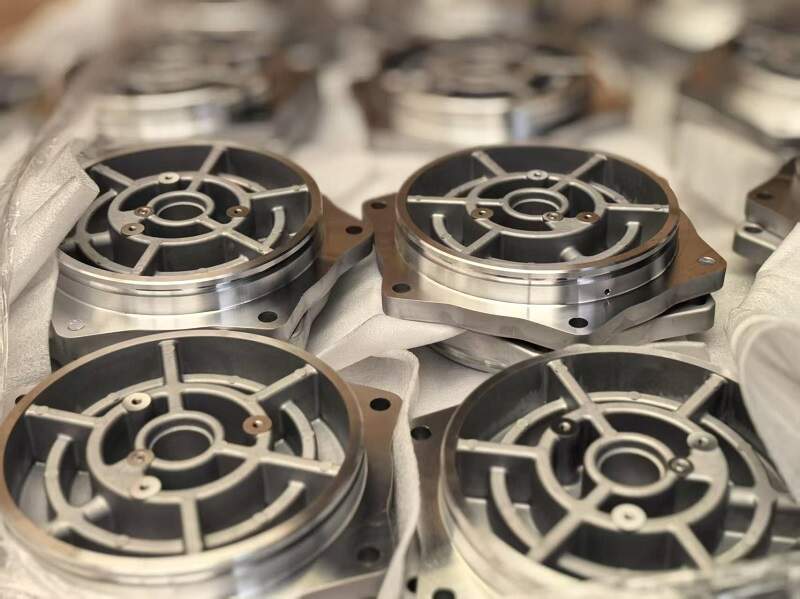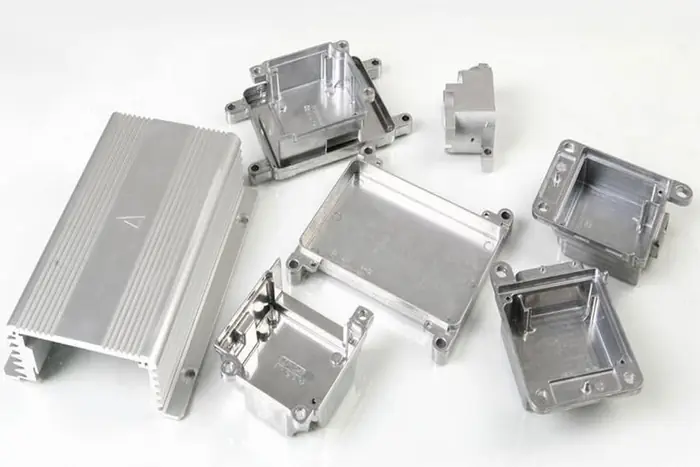Discover the breakthroughs in Precision aluminum casting for modern industries
Exploring the Function of Factory Services ahead of time Modern Design Solutions
Foundry services are crucial fit modern-day engineering remedies - aluminum casting. They connect the space in between typical manufacturing strategies and the demands of contemporary markets. With advancements in automation and sustainability, shops are advancing to fulfill the demands of industries such as aerospace and automobile. This transformation increases inquiries about the implications for products, procedures, and future innovations. What opportunities and challenges exist ahead for shop services in this quickly altering landscape?
The Evolution of Foundry Solutions in Engineering

The integration of computer-aided style (CAD) and simulation software program has actually reinvented the layout and manufacturing procedures, enabling foundries to generate complex geometries with greater accuracy. Moreover, the change in the direction of green methods has actually brought about the fostering of greener technologies and recycling initiatives within factories. As markets increasingly prioritize personalization and rapid prototyping, shop services have expanded their capacities, ensuring they remain vital contributors to the design landscape. This evolution highlights the foundry's important role in supporting developments throughout different sectors, consisting of automotive, aerospace, and power.
Secret Processes and Methods in Modern Foundries
Modern factories employ a range of vital procedures and strategies that boost the effectiveness and top quality of steel spreading. Amongst these, sand spreading continues to be widespread due to its adaptability and cost-effectiveness. The use of advanced technologies, such as computer-aided design (CAD) and computer-aided production (WEB CAM), permits specific modeling and production, making certain high precision in element measurements. Furthermore, financial investment casting is preferred for generating complex geometries with outstanding surface finishes.
In addition, automation and robotics improve manufacturing rate and consistency while lowering labor prices. Strategies like additive manufacturing are progressively incorporated to create intricate mold and mildews and cores, therefore lessening material waste. The application of thermal evaluation aids in enhancing casting procedures by anticipating and managing solidification actions. Collectively, these methods and processes exemplify exactly how contemporary foundries are adjusting to meet the needs of contemporary engineering obstacles, guaranteeing exceptional item quality and operational effectiveness.
The Value of Products Option in Factory Services
Picking the appropriate materials is essential in shop solutions, as it straight influences the mechanical buildings, durability, and total efficiency of the final product. Various products have special qualities, such as tensile toughness, rust resistance, and thermal stability, which need to align with the intended application of the cast elements. Steels like aluminum and steel are commonly picked for their strength-to-weight proportion, while alloys can enhance specific performance attributes.
In addition, the option process includes taking into consideration elements such as availability, manufacturability, and price, which can especially impact project timelines and budgets. Additionally, innovations in product scientific research make it possible for the advancement of cutting-edge composites and specialized alloys that satisfy arising design difficulties. As a result, a complete understanding of product residential or commercial properties and their ramifications is necessary for designers and shop professionals to accomplish successful end results in their jobs. This cautious selection process inevitably boosts the dependability and effectiveness of the end products.
Shop Services in Aerospace and Automotive Applications
Foundry services play a necessary duty in the aerospace and automobile markets, where precision and performance are vital. These markets rely heavily on the manufacturing of complex parts that should meet extensive top quality requirements and withstand extreme conditions. Shops provide important solutions such as casting, machining, and finishing, ensuring components are lightweight yet durable, crucial for boosting gas efficiency and security.
In aerospace, factory services add to the manufacturing of generator blades, engine elements, and architectural parts, all of which need high-performance products and detailed styles. In the automobile industry, shops provide engine blocks, chassis why not check here components, and transmission cases, concentrating on toughness and weight reduction.
Advanced foundry methods, including additive production and precision casting, are significantly used to fulfill the details requirements of these industries. By offering customized services, foundry solutions aid drive technology and keep affordable advantages in the fast-evolving aerospace and vehicle landscapes.
Innovations Driven by Shop Capabilities
Countless technologies in engineering are fueled by the sophisticated capacities of foundry solutions. These services enable the manufacturing of complicated geometries and high-performance products that are essential for modern-day applications. As an example, additive manufacturing, commonly referred to as 3D printing, has actually seen substantial advancements with foundry methods, enabling the quick prototyping of elaborate styles. In addition, the capability to cast lightweight alloys has reinvented markets such as aerospace and automobile, resulting in improved gas performance and efficiency.
Factories are increasingly integrating clever modern technologies, such as automation and information analytics, to improve manufacturing performance and high quality control. These innovations not just reduce waste but additionally make it possible for personalization at scale, fulfilling the specific requirements of customers. By leveraging sophisticated shop abilities, engineers can explore new frontiers in product style and capability, eventually driving development across various industries and establishing a foundation for future advancements.
Future Trends in Factory Services and Design Solutions
The future of foundry solutions is formed by arising patterns such as sustainable production practices, which focus on ecological responsibility. Automation and clever innovations are readied to boost efficiency and precision, while enhancing personalization and flexibility will fulfill the evolving needs of customers. As these fads evolve, they will redefine the landscape of design services in the foundry field.
Lasting Manufacturing Practices
As markets increasingly focus on ecological responsibility, sustainable manufacturing techniques within foundry solutions are becoming necessary to contemporary engineering services. These techniques concentrate on decreasing waste, minimizing power consumption, and click now using eco-friendly materials throughout the manufacturing process. By executing techniques such as reusing scrap metal and optimizing melting procedures, foundries can significantly decrease their carbon impact. Additionally, the fostering of life process analyses enables producers to examine the environmental influence of their products from beginning to disposal. Working together with providers dedicated to sustainability even more improves the effectiveness of these campaigns. Eventually, welcoming sustainable production not only aligns with international ecological goals however additionally cultivates advancement and competitiveness in the rapidly advancing design landscape.
Automation and Smart Technologies
While lots of industries are accepting technical innovations, factory solutions are experiencing a substantial transformation through automation and wise technologies. The combination of robotics and automated systems improves manufacturing efficiency, minimizes human error, and speeds up the manufacturing procedure. Smart innovations, such as IoT and AI, enable real-time monitoring and predictive upkeep, which enhance operational efficiency and decrease downtime. These developments promote data-driven decision-making, permitting foundries to respond quickly to market demands and improve product high quality. Furthermore, automation decreases labor expenses and enhances workplace security by dealing with unsafe jobs. As foundry solutions remain to adopt these technologies, they are positioned to redefine design remedies, causing raised competitiveness and sustainability in the manufacturing field.
Customization and Versatility Trends
Arising patterns in foundry services increasingly emphasize modification and versatility to satisfy special consumer demands. This shift reflects a wider demand for customized design services that adapt to details project needs and industry standards. Business are purchasing innovative technologies, such as additive production and digital modeling, enabling them to generate personalized parts efficiently and cost-effectively. Therefore, shops are moving far from one-size-fits-all techniques, supplying clients the ability to modify layouts and materials in real-time. Furthermore, collaboration between design teams and shop services is becoming more incorporated, fostering advancement and speeding up time-to-market. This trend not just improves product performance but additionally supports sustainability by minimizing waste via accurate manufacturing processes.
Often Asked Concerns
What Are the Common Prices Connected With Factory Services?
Normal costs related to factory solutions consist of product expenditures, labor charges, devices usage costs, and expenses costs - Aluminum Casting Company. These expenditures can differ widely based upon job complexity, volume, and details needs of the design solution involved
How much time Does the Foundry Process Usually Take?
The factory process commonly takes anywhere from a number of weeks to a few months, depending upon factors such as complexity, material needs, and manufacturing quantity, which can significantly influence timelines and overall job delivery.
What Industries Benefit The Majority Of From Foundry Services?
Industries such as automotive, aerospace, and building and construction benefit substantially from foundry services. These industries depend on accuracy casting and metal manufacture to produce intricate parts, boosting item efficiency and functional performance in their respective applications.
What Accreditations Should Foundries Possess?
Factories should have qualifications such as ISO 9001 for high quality administration, ISO 14001 for environmental management, and certain market accreditations like AS9100 for aerospace or IATF 16949 for auto, ensuring conformity Click This Link and quality control.
Just How Do Foundries Guarantee Quality Assurance in Their Processes?

Shop solutions are crucial in shaping modern design remedies. As design self-controls have progressed, the function of shop services has actually transformed greatly to meet developing sector demands. As industries significantly prioritize customization and quick prototyping, foundry solutions have actually increased their capacities, ensuring they stay crucial contributors to the design landscape. As markets progressively focus on ecological obligation, sustainable manufacturing practices within shop services are coming to be crucial to modern-day design remedies. Furthermore, cooperation in between design teams and foundry solutions is ending up being extra integrated, fostering advancement and accelerating time-to-market.